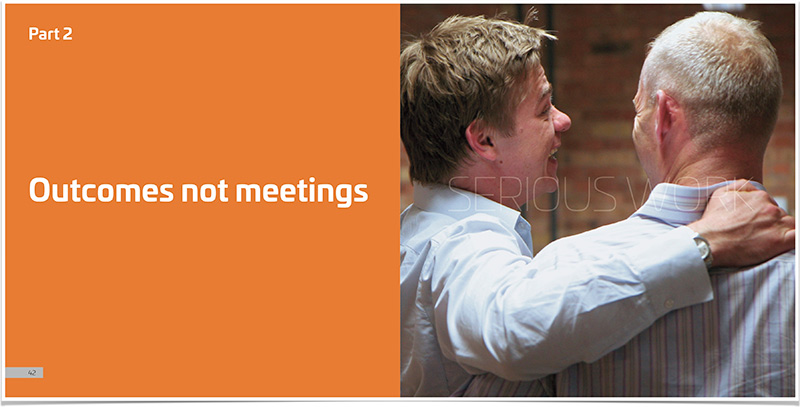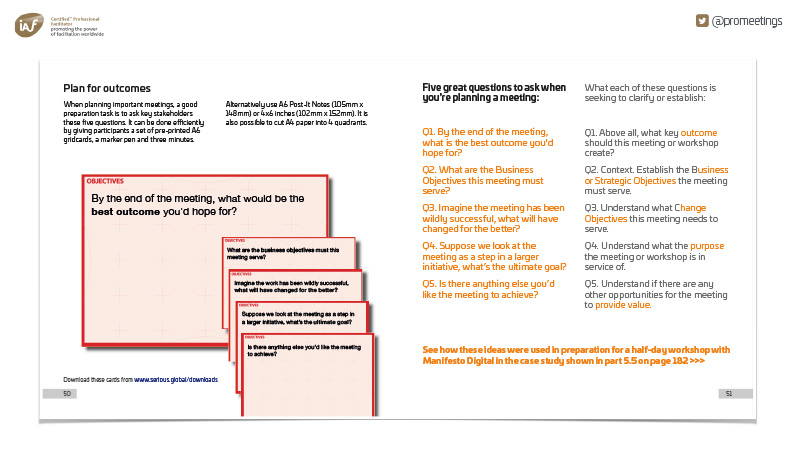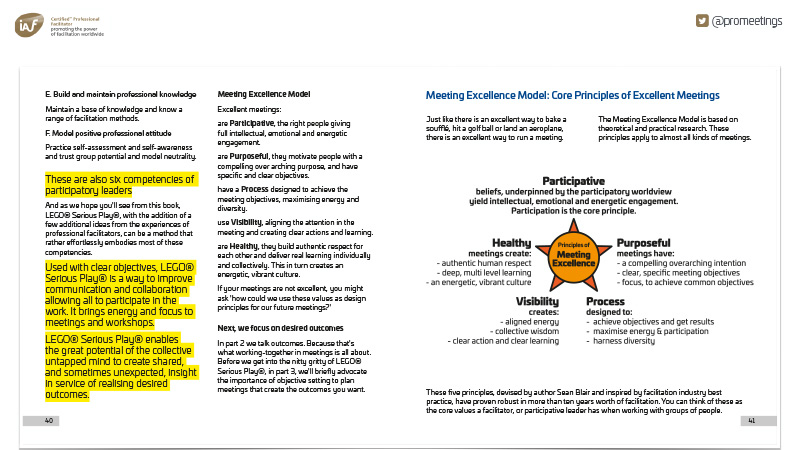Blog. Ideas for better meetingsProfessional Meeting Facilitation
Get Inspired during Facilitation Week
International Facilitation Week
"International Facilitation Week takes place each year during the third week of October. Its purpose is to showcase the power of facilitation to both new and existing audiences and to create a sense of community among facilitators and their groups worldwide.
Since its launch in 2013, the week has become a spark that ignites activities around the world to highlight the benefits of facilitation, the gifts of facilitators and the comradeship of the International Association of Facilitators (IAF)."
It's the IAF Facilitation Week, and as with every year I love finding out new stuff and getting inspired by other facilitators.
Personally, I think Twitter is a great place to see what's going one, search or use the hashtag #FacWeek.
A few posts I found inspiring this morning:
👋 (@pixlz) October 16, 2018So you want to do more facilitation? – 21st Century Mindset - a repost for #FacWeek https://t.co/laoq5KeoQh
— Sharon Dale
It's #FacWeek, the international facilitation week. A good time to think of what leaders do in the modern day world.
— Flyntrok (@flyntrok) October 17, 2018
Order's don't work. Getting the group to work is an art!#facilitation #leader #CHANGE #DigitalTransformation #OD #futureofwork pic.twitter.com/M2mDQSpidq
#FACWeek read. ‘Getting to the Bottom of Top’ by @IAFacilitators authors @jofacilitator. Fabulous exploration of the phenomenology behind why we do what we do https://t.co/qF3TvD01Hi
— Kimberly Bain (@baingroup) October 16, 2018
Méxicos posibles: Colaborando con el enemigo November 6 @ Mexico City, Mx.@adamkahane presents at the Harvard Club of Mexico on his book: Collaborating with the Enemy. https://t.co/3RDg42SR7E @reospartners #Stretch pic.twitter.com/e4zf6ZGiUB
— Reos Partners (@reospartners) October 11, 2018
You can also view all events listed in the IAF Website.
I hope you find something that inspires you in Facilitation Week!
What is facilitation?
Six facilitation tips
Having been facilitating workshops for about 20 years, I recently reflected on what is facilitation when I was asked to run a masterclass for a facilitation academy in Helsinki.
I asked myself what are the key lessons about facilitation I would teach my younger self? Here's my six lessons on successfully facilitating meetings and workshops:
1. Plan with an outcomes focus

People don’t want meetings or facilitators. They want outcomes. I approach every assignment with a focus on outcomes, part 2 of the book I wrote about facilitation is all about outcomes. How to understand what they are, how to articulate them and how to use outcomes to plan facilitation process is a core skill, maybe THE core skill.
Lesson 1 means three things:
- The contracting / preparation phase is key.
- Understanding what is really needed is at the heart of this activity.
- This skill is as important as facilitation - maybe more important than 'front-of-room' facilitation skills
2. Understand the cultural, emotional and political currents beneath the surface

Management guru, Peter Drucker, famously said "Culture Eats Strategy for Breakfast". For facilitators, we fail to take time to understand the cultural, emotional and political currents beneath the surface at our potential cost.
Lesson 2 means really one thing, in this case said in three ways!
- Understand actions are guided by thoughts and values
- The invisible shapes the visible
- Take time to understand these things!
3. Preparation takes longer than delivery

In my experience it usually takes longer to prepare for a workshop than facilitate it. This is not always the case, but certainly high stakes, high risk strategic workshops are very likely to require more preparation time than delivery time. Workshops are expensive. The time people take out of a business costs a lot, and the impact of a productive workshop (or a highly unproductive one) can be huge.
Lesson 3 means …
- Workshop design is a key skill
- Translating objectives into workshop process, taking cultural, political, emotional into account
- Good facilitators have many tools at their disposal (and are process / tool neutral. As a facilitator who sometimes uses LEGO® SERIOUS PLAY® I like it when clients enquire if I favour any particular tool. My answer is always no, I'm outcome driven, and tool neutral).
4. Own the workshop. Take responsibility for what happens. Be the (participatory) leader
When I facilitate I assume that I'm responsible for the outcome. With this mindset I assume it is my job to be a 'participatory leader' and have the participants to interact with the subject-at-hand and each other in the best way possible that achieves the outcome. My job is not about content (otherwise I'd be a consultant, not a facilitator) it is about outcome driven process.
Lesson 4 means …
- Understand the tremendous power of orchestrating or choreographing participation. This is a subtle power that might at times be invisible to participants, as they are absorbed by the content (and each other).
5. Facilitate the people not the process
In 2006 I facilitated a two day workshop for one hundred head teachers. My client team at the Governments 'Department for Education' included a wonderful man called David Jackson. I carefully planned a workshop process and during the workshop kept the participants on track with that process.
At the end of the workshop David offered me the feedback that I should 'facilitate the people not the process'. This lesson has become a core idea for me… and whilst I plan carefully (as in 3 above!) I now abandon the plan if it is not meeting the emergent needs of a group.
Lesson 5 means …
- Don't "be a slave" to your carefully prepared plan
- Develop and grow your awareness about what a group needs as a process unfolds and if something important emerges, be ready to drop, abandon or modify what you had planned.
- Invest in developing new skills and adding new tools to your 'facilitator tool box'
6. Welcome and value participation (no matter what kind it is)

The most important 'guiding principle' I use as I design and facilitate meetings is the principle of participation. It is the core idea or value that good facilitators hold.
Lesson 6 means …
- Facilitators must welcome participation no matter what its guise. If this shows up as joy or anger, a smile or a tear it is all equally welcome. To do otherwise is to not invite participation.
Four other lessons
As I pondered what I had learnt in many years as a facilitator the six lessons above seemed like the main advice I would give my younger self. Four other tips I might offer are:
Speak slowly and clearly - especially in multi-lingual events where English is not everyone's first language.
Big presence / small presence - know when to be large… and when to be almost invisible.
Create relatedness - even before the workshop begins, as people arrive, creating a sense of relatedness can be the difference that makes the difference.
Give responsibility / autonomy - empowering participants to take responsibility for what happens in the workshop will have dividends after the workshop.
Most of the images above are taken from a book about facilitation called SERIOUSWORK. Disclaimer. I wrote most of it. You can download a good chunk of it free at http://www.serious.global